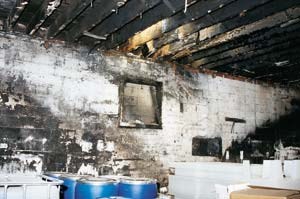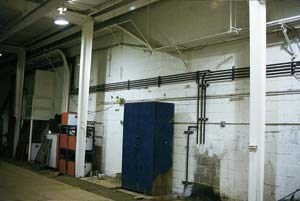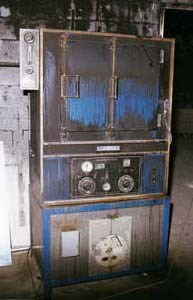Fire at Mid-Atlantic Finishing
Was anyone hurt? Were all the chemicals contained? Do you have a contingency plan? Is your insurance up to date?
At 4:15 in the morning as you race toward your flaming finishing shop, what are you thinking? I hope no one is hurt. I'm glad we aren't running a third shift. I hope all the chemicals are contained. I hope the firefighters got there in time to save most of the lines, equipment, building, laboratory, office equipment. I hope my insurance is up to date. What if everything is wiped out? What am I going to do?
These were some of the thoughts B.J. Mason struggled with as he headed to Mid-Atlantic Finishing (Capitol Heights, MD) on October 5, 2000. His son, Troy, had called to tell him that their plating shop was on fire. B.J.'s first question was, "Is anyone hurt?" Relieved to find out there were no injuries, he asked if all the chemicals had been contained. He didn't learn the answer until he arrived at the shop and saw the HazMat individual emerge from the building giving the "thumbs up" sign.
B.J. then relayed the good and bad news to Bill McGowan, chief compliance officer at Lombard Industries, parent company of Mid-Atlantic.
New Containment
What ensured the containment of all the chemicals was a limited redesign of the building in 1995. Mid-Atlantic Finishing tore out the existing containment system and replaced it with a larger volume containment system, having the capacity to hold overflow or spilled solution from its electroless nickel, silver, tin and zinc plating lines as well as the anodizing line.
The containment drains directly to the waste treatment systems. Because of this revamped containment system, all cleaning, plating, anodizing and chromating chemicals, as well as the water from fighting the fire, were contained.
Because all the chemicals were contained, there was no impact on the neighbors or neighborhood. Sad to say, however, the local news station decided there was no story since no one was hurt and no chemicals were released to the environment. However, the HazMat representative believed it was a great story, summing it by saying, "Engineering is a wonderful thing, isn't it? All the chemicals were contained."
The Fire's Out
A burned-out block building occupied the property. Inside, tanks had melted to within 2 feet of the floor. Rectifiers sat encased in globs of melted plastic. The electric panel was damaged beyond repair. The laboratory equipment was shattered. Smoke had penetrated into the offices, leaving grimy, foul-smelling soot on the walls, furniture, carpet and in every crack and crevice. Nothing was salvageable except for the area beyond the firewall. In this area, the company will install a new automatic hoist plating line. The firewall kept out the fire, heat and smoke.
Contingency plan
Now it was time for Mid-Atlantic to implement the contingency plan it had written just six months prior to the fire. The plan called for Troy Mason, vice president, and Jim McCormick, general manager, to keep the employees working and the customers happy. To do this, the two men had to coordinate efforts with their sister company, Alexandria Metal Finishers (Lorton, VA).
When word of the fire was relayed to Larry Capoccia, general manager of Alexandria, he returned from vacation to help Troy and Jim coordinate the monumental task.
Once Mr. Capoccia's employees, Troy and Jim were comfortable with the plan, Mr. Capoccia returned to his vacation. The plan was to incorporate as much of Mid-Atlantic's customers' work into the plating lines at Alexandria as possible.
Tim Baublitz of Seiler Hughes shipped all necessary materials directly to Alexandria beginning the day after the fire. Mid-Atlantic was running customers' parts by Monday October 9, just 4 days after the fire. Customers have not noticed any interruption in service.
Another part of the contingency plan concerned the employees. Mid-Atlantic rented buses to transport them from the shop in Capitol Heights to Alexandria. Employees were also furnished with box lunches and, most important, no employee has lost any time because of the fire. "In fact, the employees are getting all the overtime they want," commented Mr. Mason.
Having Alexandria, a sister company under the Lombard Group, was particularly helpful to Mid-Atlantic. "I've had offers of help from other shops across the country, but I don't think we could have been up and running in four days if we weren't so closely associated with Alexandria," noted Mr. Mason.
Another Lombard company, Whyco Technologies (Thomaston, CT), is helping design the new plating shop. It is helping Mr. Mason with his part of the contingency plan.
Mr. Mason's job within the contingency plan is cleaning and rebuilding Mid-Atlantic Finishing. Fortunately, he has had help with the paperwork and other time-consuming tasks. "Lombard tries to provide a value-added service," noted Mr. McGowan. "We handle the paperwork and provide other resources, allowing the companies to take care of their customers and people."
Insurance
Lombard is aware that it does not know the finishing business half as well as Mid-Atlantic does. So when it purchased the insurance policy, it invited input from Mid-Atlantic as well as the insurance broker.
"My advice to any finisher," stated Mr. Mason, "is to review your property insurance, your content insurance and your business interruption policy often. You never review your plan often enough to know when your contents went from a quarter of a million in value to two million." Mr. Mason held up a 1 ½-inch thick binder showing the company's first submittal to the insurance company, emphasizing his point.
"Make sure you think about the plan in terms of a plating business," offered Mr. McGowan. "Many brokers are not thinking that way. They do not consider all the actual costs of running a plating business, particularly the of running a shop and the costs of chemical disposal."
Chemical Disposal Costs
Chemical and debris disposal costs were a significant part of the cleanup costs. Tri County Environmental was hired to do the chemical clean up work. Trained HazMat employees geared up in protective garments each morning prior to entering the plating shop. The crew separated the acids, caustics and cyanides and stored them in three bermed areas outside the building.
Three tractor-trailer loads and three box trucks of chemicals were hauled to Pennsylvania for treatment and disposal.
The New Mid-Atlantic Finishing Facility
One safety precaution Mr. Mason plans for the rebuilt facility that he did not have previously is a sprinkler system. "Some people say you cannot have sprinkler systems, particularly fire departments, because they are afraid you will overflow your containment system. That is a reasonable concern, but we will have it when we put the facility back together. If a sprinkler could have put the fire out right at the electroless nickel tank, it may not have spread throughout the building."
During the rebuilding, Mid-Atlantic will have to meet many codes that it was grandfathered in on before, such as egress, handicapped parking spaces and stairwell width and depth. As frustrating as it is, Mr. Mason takes it all in stride.
"Hey, you know the saying, 'when life gives you lemons, make lemonade,'" he stated. "We can't change the fact that we had a fire. But we are making the best of the situation. The real heroes in all of this are Troy Mason and Jim McCormick from Mid-Atlantic. They have kept the business going, making sure the work gets done and the employees are taken care of. They have an apartment down by Alexandria Finishers, where they are putting in 16-hr days. Larry Capoccia and the crew at Alexandria are also heroes in this story. Without their cooperation, we could never be running at 90%, as we are now."
Read Next
Episode 45: An Interview with Chandler Mancuso, MacDermid Envio Solutions
Chandler Mancuso, technical director with MacDermid Envio discusses updating your wastewater treatment system and implementing materials recycling solutions to increase efficiencies, control costs and reduce environmental impact.
Read MoreEducation Bringing Cleaning to Machining
Debuting new speakers and cleaning technology content during this half-day workshop co-located with IMTS 2024.
Read MoreDelivering Increased Benefits to Greenhouse Films
Baystar's Borstar technology is helping customers deliver better, more reliable production methods to greenhouse agriculture.
Read More















.jpg;maxWidth=300;quality=90)






